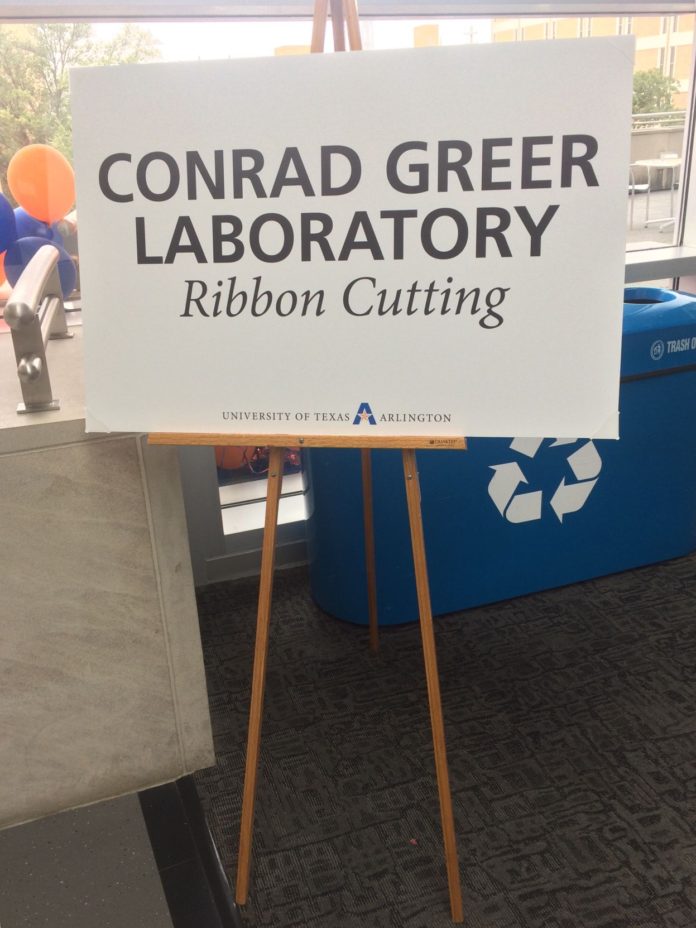Greenway Technologies Inc.
8851 Camp Bowie Blvd. West
Suite 240
Fort Worth, TX 76116
http://gwtechinc.com
Board of directors: D. Patrick Six, Raymond Wright, Kevin Jones, T. Craig Takacs, Kent Harer, Ransom B. Jones
GTL Project: Wright and Conrad Greer began more than seven years ago
UTA Partnership: Began sponsoring research in 2009
Two step gas-to-liquid process:
1. Convert natural gas to syngas
2. Convert syngas into liquid fuel
There are currently four GTL processes, not including Greenway’s new patented process.
The University of Texas at Arlington opened its new gas-to-liquid laboratory June 26, named for the late Conrad Greer.
The lab is underwritten by Greenway Innovative Energy, a Greenway Technologies Inc. company.
It was Greer, 83, who died April 20, who initiated the natural gas GTL idea with Ray Wright, president of Greenway Innovative Energy Inc. That started the company on the journey to helping change and innovate energy production in the United States.
During his career, Greer was area engineer for Texaco, president and CEO of Greer Petroleum Co. and president of Omniferous Engineering Co.
Greenway’s stockholders and investors fully funded the university’s new $750,000 lab and donated the millions of dollars’ worth of equipment, hardware and development of technology within it.
Researchers in the lab are already converting natural gas into jet and diesel fuel on a small scale and hope to create gasoline fuel in the future. They are using plentiful and less expensive natural gas rather than coal and oil and Greenway says its process is streamlined so it can be done in a smaller facility and more economically than in current oil refineries.
The Greer lab is located in UT Arlington’s Science Hall, Room 312, and has four doctoral students along with chemistry department chairman Fred MacDonnell and mechanical and aerospace engineering professor Brian Dennis.
Mechanical engineer Pawarat Bootpakdectam, Ph.D., has worked with Greenway on sponsored research projects for four years and has been involved with the Greer lab since the beginning.
“Basically, we synthesize the liquid oil from gas,” she said. “We make the catalyst to convert gas to liquid and then right now many investors [are] interested to make it commercial by improving the catalyst quality and produce more the oil. [But] right now, we are trying to make good products and increase the quality.”
For the students working in the new lab, this is an opportunity to do research, not just academic studies, and to work with technology that may go much further than the lab and could eventually impact how energy is produced.
Mechanical engineer Saiedeh Arabi, a doctoral student, came to UT Arlington in January 2016 to work on the GTL project.
“In addition to doing experimental data and construction inside the pilot, I also do the numerical and simulation work for the reactors for the GTL,” Arabi said. “The simulation of the reactor is so interesting to me – to optimize the flow rate, reaction rate, according to the time, and also the increased productivity. And the most, most interesting stuff for me is the simulating; it becomes really interesting for me that I can predict what I want to do.”
In 2009, Fort Worth-based Greenway started its first sponsored research agreement with UT Arlington. Patrick Six, Greenway Technologies Inc. president and chairman, and Wright, worked with Dennis and MacDonnell on the Fischer-Tropsch process.
“What you see today is so far from where we started this,” Dennis said. “We started with just a capillary tube with 100 milligrams of catalyst, and we were making drops and drops of fuel in over a week.”
After more work and growth, they established the CREST (Center for Renewable Energy, Science & Technology) Lab, where they built an apparatus that could use 2 grams of catalyst and make milliliters of fuel in a week.
“Now, with the generous help of Greenway Innovative Energy we have a fully functioning pilot plant where we can make liters – like a liter a day – so we can make gallons of fuel a week,” Dennis said. “We’ve gone all the way from something that you could hold in your hand to a big huge machine.”
UT Arlington President Vistasp Karbhari praised the collaborative efforts of MacDonnell and Dennis, who have worked together to “create new fundamental science that is then transformed into technology.”
“The transformation of that technology into something that can be used by the rest of the world … is what comes through Greenway.”
This project is all about taking natural resources and converting them into something for everyday use, he said.
“That is a tremendous impact not just in our university, not just in the Metroplex, but across the nation,” Karbhari said. “The dependence on energy is something we need to address, and that is what Greenway is doing.”
In an informational booklet provided at the opening, Six said, “At lab scale, we have created and patented a solution which affordably converts natural gas to clean-burning diesel and jet fuel. The next step is to put the technology into commercial production.”
The system that Greenway has created is called the “G-Reformer” and it accomplishes the initial natural gas to syngas conversion. Then, the syngas is run through the Fischer-Tropsch (FT) process. The G-Reformer unit has three outputs: gas, heat and water. The syngas is then put through the FT unit to become liquid, which can be made into diesel or jet fuel.
Greenway stakeholder Mark Zoellers said that its smallest plant, a 500 barrel per day facility, could provide enough heat, water and gas for a city of 5,000.
“The big deal is that we’ve proven the technology; we know it works,” he said. “Being able to manufacture the syngas is the magic.”
Zoellers added that the captured heat can be used to produce energy and the water can be filtered to be clean, usable water for drinking and other purposes. But the heat isn’t the only output with multiple uses.
Syngas can be used to make plastics and has other uses in various industries as well. And while the GTL fuel production is the primary objective, Wright said, “Income-based revenue streams are incorporated into the product line.”
Wright added that Greenway plans to have its first commercial plant on the ground in two years. The company has been looking at the Dallas-Fort Worth area, but recently has been contacted by people in Kentucky and West Virginia, where there is an effort to build industries beyond coal.
Greenway plans to release a whitepaper in the coming months that will go into more detail of the GTL technology and future plans.
“We commercialize next,” Zoellers said. “But this is a huge step.”
Six commended the work of those involved in the project, for they “have gone beyond the call of duty.”
“Because of them and what they have done with us, you are going to see a disruptive technology today that has the potential to be a world-changer,” he said. “We have the potential for Texas to lead the world in the most economic way of producing diesel and jet fuel.”







